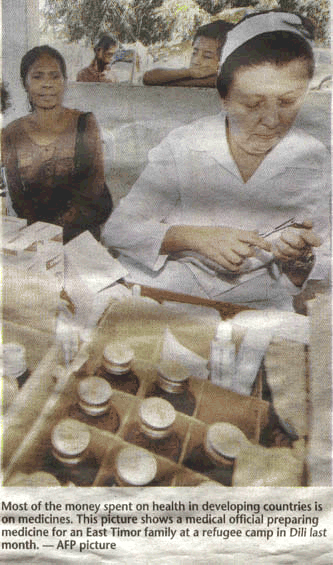Curing the high-cost syndrome
Dato' Dzulkifli Abd Razak
Article
New Sunday Times - 07/09/2006
The Health Ministry's announcement last week that it is working on a proposal to cap the prices of more than 1,000 essential medicines is welcome, though the move is long overdue.
For a long time, the question of drugs has been a bone of contention between Malaysian health activists and consumers. The last time Malaysia discussed this issue was almost a decade ago but it was of little avail. Maybe this time it will be different.
A survey recently (NST, May 9) showed that many Malaysians pay exorbitant prices for their medicines. In fact, drug prices in Malaysia are far above the international reference pricing, a guide on how much medicine should cost.
Article
New Sunday Times - 07/09/2006
The Health Ministry's announcement last week that it is working on a proposal to cap the prices of more than 1,000 essential medicines is welcome, though the move is long overdue.
For a long time, the question of drugs has been a bone of contention between Malaysian health activists and consumers. The last time Malaysia discussed this issue was almost a decade ago but it was of little avail. Maybe this time it will be different.
A survey recently (NST, May 9) showed that many Malaysians pay exorbitant prices for their medicines. In fact, drug prices in Malaysia are far above the international reference pricing, a guide on how much medicine should cost.

The ministry's list of essential medicines will include antibiotics, aspirin and other painkillers, as well as medicines for high blood pressure and depression.
The proposal is expected to be translated into reality when the National Medicines Policy is implemented. The main aim is to ensure patients have access to safe, high-quality and effective medication at affordable prices.
The Minister of Health was quoted-as saving: "We are concerned over the high price of essential medicines and it is time for us to have some form of control over pricing."
The draft proposal, said the minister, will be presented to the Cabinet within two months.
A national medicines policy is a fundamental component of the World Health Organisation (WHO) Medicines Strategy.
The goal is to help save lives and improve health by ensuring the quality, efficacy, safety and rational use of medicines, including traditional medicines, particularly for the poor and disadvantaged.
It goes without saying that issues, especially that relating to the affordability of medicines, are major health determinants of a country.
It has been documented that in developing countries, much of the health expenditure goes towards buying medicines.
Prices of medicines are generally well above their production cost.
Profits of those in the distribution chain (pharmacists, dispensing doctors, wholesalers, and even some governments) are frequently high, according to a recent study, "Medicines: Too costly and too scare", carried out on behalf of WHO and an Netherlands-based non-governmental organisation, Health Action International ( www.haiweb.org/medicineprices ).
According to the study, in Malaysia, the final mark-up for a heart drug, atenolol (for 60 tablets, 50mg), can be as high as 150 per cent for its generic form and up to 80 per cent for the branded item.
The actual cost of the branded medicine is RM72 compared with RM24 for the generic product.
As another example, for generic omeprazole (30 capsules, 20mg), the pharmacy mark-up is the largest component cost at 140 per cent.
For the original brand of the medicine used to decrease the amount of acid produced in the stomach, the pharmacy mark-up is also significant, though lower, at 38 per cent.
Being a country where doctors dispense medicines, the price data for Malaysia is equally revealing.
The study found that the profits for doctors were higher than for the pharmacists and also excessive: 146 per cent for the original.
For omeprazole, the dispensing doctor's mark-ups were 316 per cent for the generic form and 50 per cent for the original.
Based on such evidence, it is important that the National Medicine Policy be given the utmost urgency, if the health status of Malaysia is to be protected, if not improved.
And capping the prices of medicines is certainly one that needs to be implemented without delay. No doubt the lobbying against any such move will be intense, but the Government must be stead-fast in the face of irrational price increases.
Nowhere is this problem more acute than in many developing countries, plagued by the most fundamental health problems.
Medicines have not provided the "real" or desirable answer to many pressing health threats in such countries. Instead, they have resulted in the waste of scarce resources.
The truth is that for many people, modern drugs do not necessarily work.
This startling fact was admitted to by a vice-president of a leading pharmaceutical giant when he said recently: "The vast majority of drugs — more than 90 per cent — only work in 30 or 50 per cent of the people."
This admission makes us examine the very nature of modern medicine itself.
As Ghandi had noted, the large number of hospitals is not a sign of health, but decay.
Unless we admit this, and make profound changes, the decay will overwhelm the global community sooner than we can imagine.
